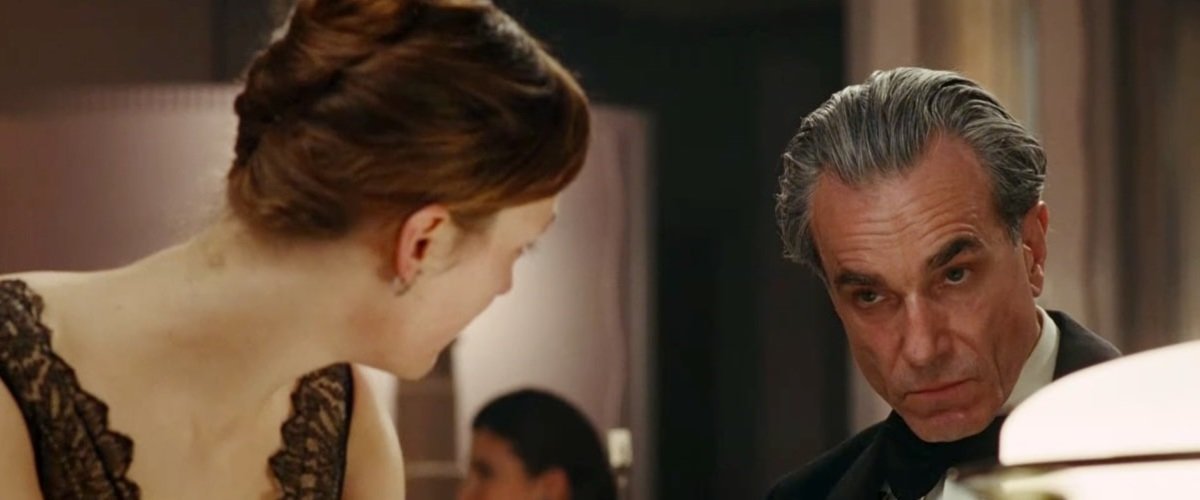
Directed by: Paul Thomas Anderson
Starring: Daniel Day-Lewis, Vicky Krieps, Lesley Manville
We meet Reynolds Woodcock (Day-Lewis) and we are immediately fascinated, even though we couldn't imagine a fate worse than being forced to dine with him. He is a fashion designer to the wealthy and powerful in 1950's England; creating custom designed works of art in the forms of gowns and wedding dresses. He grooms impeccably, is a slave to his routine, and conducts both his professional and personal life with as little wasted movement as possible. Breakfast is his "quiet time" and heaven forbid you spread butter on your toast with a little too much force or make too much noise pouring a glass of juice. He will flash a perturbed look and his sister, Cyril (Manville) who coldly runs the business end of things, later kicks the woman to the curb. She knows Reynolds all too well. ("When should I tell this girl to stop waiting around for you to fall in love with her?")
That appears to change when Reynolds meets a young waitress named Alma (Krieps) in a restaurant. He orders a great deal of breakfast food and is impressed when Alma remembers it all. He smiles at her pleasantly and asks her to dinner. Soon, she is living with him as a muse and lover, in that order. Alma models Reynolds' creations, but soon learns he doesn't have much other use for her. His work is his first love, while Alma will have to make an appointment to even have a quiet dinner with him, much less sex. This will not do for Alma, and then Phantom Thread starts to evolve into a strange dynamic between Reynolds, Alma, and Cyril (who has forever been the "woman" in Reynolds' life and is now facing a threat of being pushed aside). There won't be a threesome, so get that out of your head, but what exists is an ever-changing battle of wills. Alma won't let Reynolds go without a fight and won't let Cyril push her around, which is something neither is used to.
Reynolds' home is really nothing more than a glorified workplace where seamstresses await Reynolds' every command. He is not adept to handle anything which interrupts his routine and his power. Alma just wants to love him, but who exactly is Reynolds Woodcock? Is he capable of loving anything, even his work? He is a man of unrealistically meticulous standards which act as a defense mechanism. He rarely lets his guard down, but there are moments when he does, which is when Alma is able to get close. The trouble is, Reynolds doesn't do it nearly enough for her liking.
I reflect on the storied, multiple award winning film career of Daniel Day-Lewis and I can't think of one film in which he plays a generic character. He does not settle for safe, one-dimensional characters. He wants challenging and convention-defying roles and immerses himself completely in them. Much has been reported on him staying in character throughout shooting of movies such as Lincoln (2012), but it works and why change what has been successful? Reynolds Woodcock is memorable, if not altogether pleasant, because Day-Lewis understands him inside and out. Maybe there is a little of Day-Lewis in him. Or a lot.
Phantom Thread isn't just a Day-Lewis tour de force, however. Krieps is able to hold her own against both the overpowering actor and character. Lesley Manville also shines as a coldly frank businesswoman who says things like, "let me be unambiguous" when dealing with others. Cyril may be a lot of things, unambiguous is not among them. This strong trio of actors carries Phantom Thread along, even through a final fifteen minutes which I'm still having trouble buying; a revelation which doesn't fit with what has come before it. Up until the final fifteen minutes, Phantom Thread was a unique film which took some time to reveal itself and the natures of its characters. We think we have it wired and then defies our expectations time and again. Then, it goes a little overboard, kind of like the final minutes of Magnolia (1998) in which frogs inexplicably rained from the sky. That doesn't happen here, but Anderson again leaves us with a film which mostly works, but doesn't quite feel completely realized.
No comments:
Post a Comment